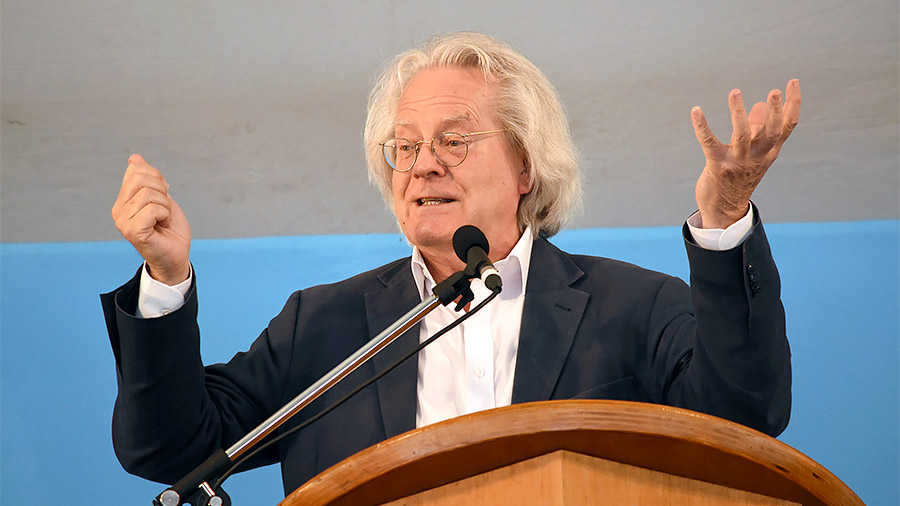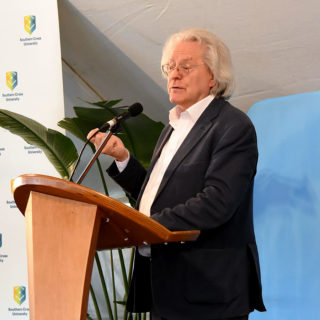Thea Astley address: A.C. Grayling on trust in Australian democracy
 What is a democracy, and is it working?
What is a democracy, and is it working?
A.C. Grayling, presenting the annual Thea Astley Address at Byron Writers Festival, doesn’t seem to think it is.
Grayling, who is Master of the New College of the Humanities, describes himself as an ‘atheist, secularist [and] humanist’.
He takes us back to what he sees as Plato’s misconstrued perception that democracy is dangerous; that putting power into the hands of the people will lead to anarchy and, consequently, tyranny.
It wasn’t until 101 years ago that democracy was spoken without words of negativity and by the twentieth century it had become a ‘feel-good’ term.
‘Democracies are noisy and require arguments and debates… but that noise is a sign of health. It protects our ability to speak freely and live under a regime of human rights so we should embrace it,’ says Grayling.
Grayling draws on the notion of democracy as the human right to have a ‘good enough’ government. He uses this term repeatedly throughout his speech.
By saying this, he is commenting on the essentiality of having a representative democracy whereby the system works, so society can make a transition from the right to have a voice to the right to simply exist without fear of governmental control.
Australia was created as a representative democracy and therefore should be committed to a representative government where ‘both houses of the Federal Parliament are ‘directly chosen by the people’.
This form of democracy means that Australia should have a ‘government that will take the interest of the whole community into account,’ says Grayling.

A democracy fails to work, he says, when politics becomes a career, instead of a service.
‘People who want to get into a position of power eventually want to get up the greasy pole, and to do that means you have to stay firmly attached to the person’s buttock above you.’
This process is one that challenges morals and principles, and now here we are, with a collapse of accountability in the political class and a diminishment of trust from the people.
Figures released by The Guardian show that voter’s satisfaction with Australia’s democracy has falled sharply.
In 2007, when the Rudd Labor government was elected it sat at 86 percent.
By 2013, after several changes of prime minister under Labor it had slid to 72 percent.
Fast forward to 2018, through the Abbott-Turnbull-Morrison roundabout, trust in democracy has crashed out at 41 percent in 2018.
‘We need to change the nature of politics,’ says Grayling.
Yet, Grayling believes that the most pressing issue for democracy in our time is the use of our social media data to manipulate the electoral process and voter intentions.
He says that when we use social media, while it doesn’t cost us economically, we do pay for it personally and as a society when our information and data is gathered and sold to political campaigners and parties.
Through ‘pure manipulation of your trigger points, you’re being targeted without realising it,’ says Grayling.
The algorithm that is used to investigate our belief systems, our likes and dislikes would be a fair tactic if it was done in an ethical way with full transparency. That is, if the targeted group knows who this person is and what their agenda is.
‘The internet is the biggest laboratory ever built. We have to be good at being critical and conscious that all our information is being given to people to use.’
While Grayling believes the system of representative democracy is failing us, he also thinks we need to persevere with it, by finding a representative that can be trusted to go to the parliament, get the facts and form a judgment that is deemed ‘good enough’.
If the job is not done on the people’s behalf, and in an honest and sincere way, then it is necessary to find a different representative, and to do so until the right one is found.
‘If we were all humanists and we all had that as the basis of our ethics, what a better world it would be,’ says Grayling. With this final remark, the audience rose to give a standing ovation.
Stacey Schwenk is a Southern Cross University Digital Media and Communications student. Southern Cross University students have reported on Byron Writers Festival since 2010. Find out where a degree from Southern Cross University can take you.
